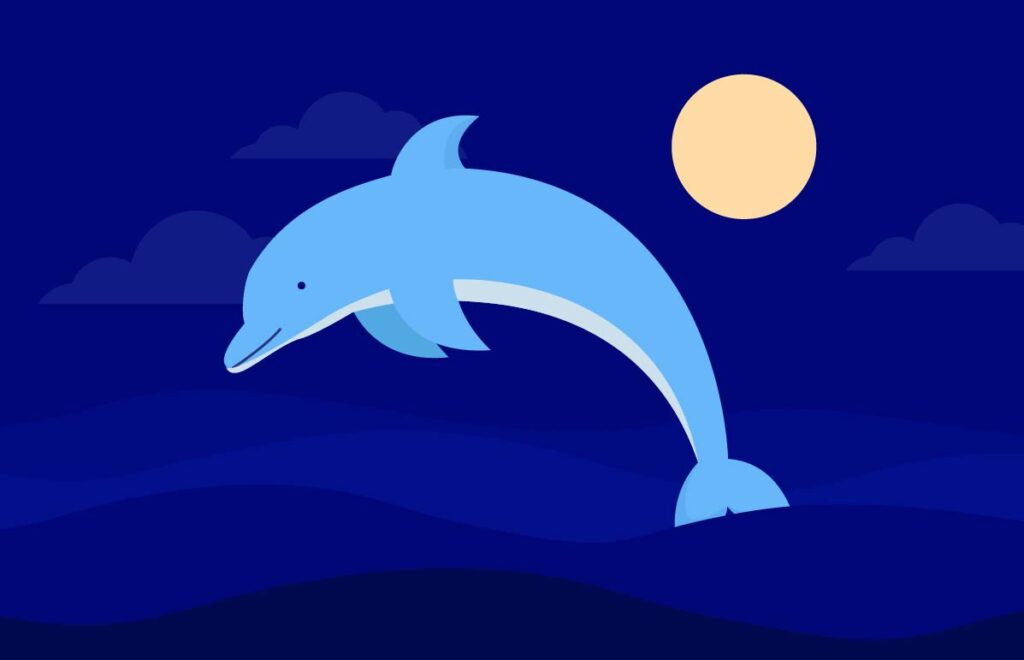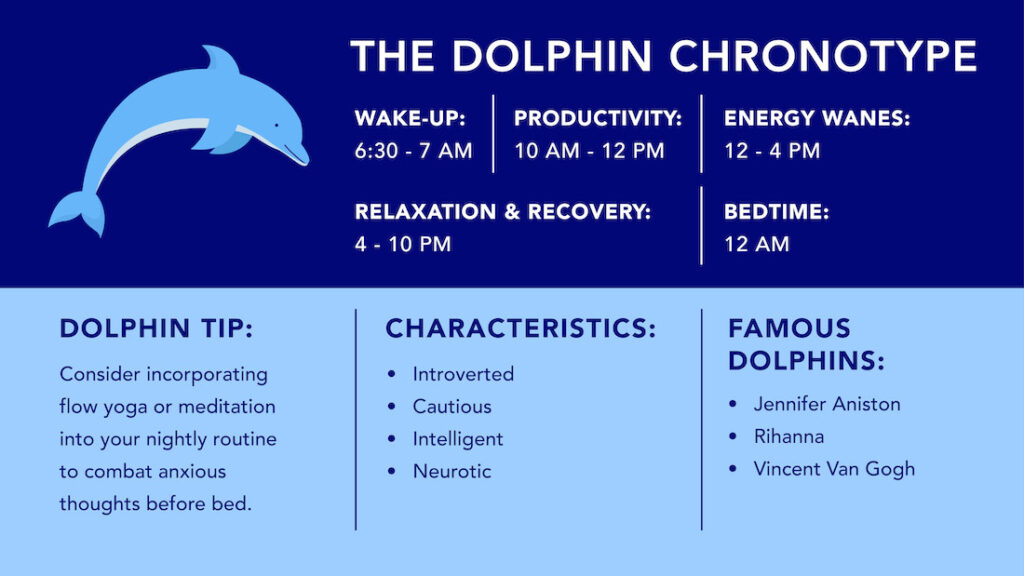
If sleep feels elusive to you, whether it’s difficulty falling asleep or staying asleep, you might be a dolphin — chronotype, that is. The dolphin chronotype, which was introduced by Dr. Michael J. Breus, PhD, in 2016, is so named because its animal namesake only sleeps with half their brain at a time, allowing the animals to get their rest while remaining vigilant.
Humans aren’t actually sleeping with one eye open, but when dolphin sleep habits frequently lean into insomnia, it could certainly feel that way. And while discussions on chronotypes tend to focus heavily on sleep preferences, chronotypes can effect other areas of your life, too. Not sure what chronotype you are? Take our quick chronotype quiz to find out!
Long Story Short
- Dolphin chronotypes are light sleepers, prone to insomnia, and easily disturbed by the goings on in their sleep environment.
- A typical dolphin chronotype sleep schedule is late to bed and early to rise.
- The dolphin personality is intelligent, detail-oriented, and intense.
What Is a Chronotype?
Lauri Leadly, CCSH, RPSGT, clinical sleep educator, founder & president at Valley Sleep Center, tells Sleepopolis that chronotype essentially refers to someone’s inclination to sleep during certain hours. Leadley notes that there are four chronotypes, “morning, intermediate, evening, and night owls.” Ultimately, the ideal sleep schedule for any chronotype is based on the person’s internal clock, and while chronotypes are largely based on genetics, age and light exposure can also play a heavy hand.
The Dolphin Chronotype
“Dolphin chronotypes are light sleepers, easily disturbed, and most frequently individuals who suffer from insomnia,” says Leadly. “They [typically] sleep less than the recommended 8 hours per night and are easily bothered by other disturbances that cause insomnia, including noise, movement, and temperature change.”
As a result of their irregular sleep schedules and frequent night wakings, dolphin chronotypes often have difficulty waking up and tend to feel groggy in the morning, and, as you might have guessed, they take a little while to get cracking on their to-do lists. Dolphins are most energetic around mid-morning, and their peak productivity time is between 10 a.m. and 2 p.m.
Beyond sleep schedules and sleep habits, chronotypes also have implications for personality traits. The dolphin personality is intelligent, detail-oriented, and maybe even a little neurotic. Moreover, dolphins tend to be introverted, so much so that they’ll likely avoid social situations.
Dolphins are the rarest chronotype, with only about 10 percent of the population falling into the category.
The Best Dolphin Chronotype Sleep Schedule
Like most chronotypes, dolphin sleep habits tend to follow the same patterns night after night. Unlike other chronotypes, dolphins find it difficult to shut off their thoughts when bedtime rolls around. As a result, they don’t often sleep early, nor do they linger in bed when morning comes.
A typical dolphin chronotype schedule looks something like this.
Wake Up: 6:30 a.m.
Sleep doesn’t come easy for dolphins, so you won’t find this chronotype sleeping late into the morning. The typical wake-up time for dolphin chronotypes is around 6:30 a.m. or 7 a.m. at the latest.
Maximum Productivity: 10 a.m. – 12 p.m
Unlike lion chronotypes, Dolphins aren’t exactly “up and at ’em” the moment they wake up. They typically take time to get past the grogginess, but once they shake off the sleep inertia, they’re ready to get down to business. Ultimately, this means that dolphins are most productive between 10 a.m. – 12 p.m. For that reason, Leadly says dolphins should schedule their most demanding tasks and challenging projects during this brief but productive window.
Midday Slump: 12 p.m. – 4 p.m
Energy reserves for dolphins often approach “empty” immediately following their peak productivity window, so light work and tasks that don’t require a lot of focus should be reserved for this timeframe.
Winding Down: 4 p.m. – 10 p.m
Like most of us, dolphins prefer to spend their time after work relaxing and unwinding.
Bedtime: 12 a.m.
Dolphins are the insomniacs of the four chronotype groups, and their time in bed is often spent ruminating over one thing or the other. Ultimately this means that sleep latency is delayed, and sleep times around midnight are not uncommon.
Tips for Getting Through the Day as a Dolphin

To get through the day, Leadly advises dolphins to “be mindful in other areas of their life and eat well.” More specifically, she says, “Don’t eat late into the evening, and avoid high protein, sugar, excessively salty snacks, and alcohol right before bedtime.”
Since dolphin sleep habits are marked by trouble falling asleep and staying asleep, Leadly suggests that dolphin chronotypes pay closer attention to their sleep environment and sleep hygiene. “Make your bedroom a calm, dark, and cool place to sleep,” she says. “Do everything in terms of practicing good sleep hygiene: shower before bed, make sure you have a comfortable mattress, sheets, pillows, and blankets, and skip [screens with blue light] at least one hour before bed.”
In terms of exercise, Leadly says dolphin chronotypes should capitalize on high-energy windows and get their exercise in during their most productive part of the day, late morning to early afternoon.
She notes also that meditation and flow yoga can help dolphin chronotypes fall asleep more quickly — and stay asleep.
FAQs
When should a dolphin chronotype drink coffee?
“Dolphins should beware not to drink anything with caffeine too late, as it may interfere with restful sleep,” says Leadly, who adds that a “3 p.m. cutoff is wise.”
How long should a dolphin chronotype sleep?
Dolphins often struggle to fall asleep and stay asleep, and while it may be easier said than done, people who fall into this chronotype should still aim for seven to nine hours per night.
The Last Word From Sleepopolis
Your chronotype is your body’s propensity to sleep and wake at certain times. Dolphin chronotypes are essentially insomniacs; they tend to have trouble falling asleep and staying asleep. While they wake up early, they don’t really get going until later in the morning. The ideal dolphin chronotype sleep schedule is 12 a.m. and 6 a.m., while the most productive part of a dolphin’s day is between 10 a.m. to 12 p.m.
Sources
Kalmbach DA, Schneider LD, Cheung J, et al. Genetic Basis of Chronotype in Humans: Insights From Three Landmark GWAS. Sleep. 2017;40(2):zsw048. doi:10.1093/sleep/zsw048
Heyde, I., Oster, H. Differentiating external zeitgeber impact on peripheral circadian clock resetting. Sci Rep 9, 20114 (2019). https://doi.org/10.1038/s41598-019-56323-z
Sussex Publishers. (n.d.). The four chronotypes: Which One are you? Psychology Today. https://www.psychologytoday.com/us/blog/sleep-newzzz/202104/the-four-chronotypes-which-one-are-you
Randler, C., Schredl, M., & Göritz, A. S. (2017). Chronotype, Sleep Behavior, and the Big Five Personality Factors. SAGE Open, 7(3). https://doi.org/10.1177/2158244017728321
(PDF) an in-depth look into the association between morningness … (n.d.). https://www.researchgate.net/publication/328250839_An_in-depth_look_into_the_association_between_morningness-eveningness_and_well-being_evidence_for_mediating_and_moderating_effects_of_personality
Carney CE, Harris AL, Falco A, Edinger JD. The relation between insomnia symptoms, mood, and rumination about insomnia symptoms. J Clin Sleep Med. 2013;9(6):567-575. Published 2013 Jun 15. doi:10.5664/jcsm.2752
Leadly, Laurie. Personal Interview. June 11, 2024.


























